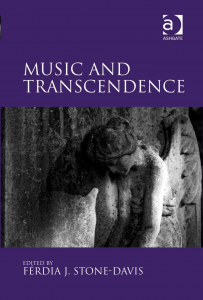 Music and Transcendence (Ashgate, July 2015). This edited volume explores the ways in which music relates to transcendence by bringing together the disciplines of musicology, philosophy and theology, thereby uncovering congruencies between them that have often been obscured. Music has the capacity to take one outside of oneself and place one in relation to that which is ‘other’. This ‘other’ can be conceived in an ‘absolute’ sense, insofar as music can be thought to place the self in relation to a divine ‘other’ beyond the human frame of existence. However, the ‘other’ can equally well be conceived in an ‘immanent’ (or secular) sense, as music is a human activity that relates to other cultural practices. Music here places the self in relation to other people and to the world more generally, shaping how the world is understood, without any reference to a God or gods. The book examines how music has not only played a significant role in many philosophical and theological accounts of the nature of existence and the self, but also provides a valuable resource for the creation of meaning on a day–to–day basis.
Music and Transcendence (Ashgate, July 2015). This edited volume explores the ways in which music relates to transcendence by bringing together the disciplines of musicology, philosophy and theology, thereby uncovering congruencies between them that have often been obscured. Music has the capacity to take one outside of oneself and place one in relation to that which is ‘other’. This ‘other’ can be conceived in an ‘absolute’ sense, insofar as music can be thought to place the self in relation to a divine ‘other’ beyond the human frame of existence. However, the ‘other’ can equally well be conceived in an ‘immanent’ (or secular) sense, as music is a human activity that relates to other cultural practices. Music here places the self in relation to other people and to the world more generally, shaping how the world is understood, without any reference to a God or gods. The book examines how music has not only played a significant role in many philosophical and theological accounts of the nature of existence and the self, but also provides a valuable resource for the creation of meaning on a day–to–day basis.
Book contents:
Music and Absolute Transcendence
- Music and the beyond in the later Middle Ages. Christopher Page
- Hearing the transcendental place: sound, spirituality and sensuality in the musical practices of an Indian devotional order. Sukanya Sarbadhikary
- ‘Sonorous air’: the transcendent in Ferruccio Busoni’s aesthetics of music. John Habron
- Creatio ex improvisatio: Chrétien on the call, Bruce Ellis Benson
- Unwritten theology. Notes towards a natural theology of music, Russell Re Manning
- Music and the transcendental, Roger Scruton
- Theomusical subjectivity – Schleiermacher and the transcendence of immediacy, Jonas Lundblad
- Negotiating musical transcendence, Jeremy S. Begbie
Music and Immanent Transcendence
- C.P.E. Bach’s Heilig and ‘the Holy’ of Rudolf Otto: An 18th-century experience of the Mysterium Tremendum, Joshua A. Waggener
- Music and world-making: Haydn’s String Quartet in E flat major, op. 33 no. 2, Férdia J. Stone-Davis
- Music and Immanence: the 1902 ‘Beethoven Exhibition’ and the Vienna Secession, Diane V. Silverthorne
- ‘Where nature will speak to them in sacred sounds’: music and transcendence in E.T.A. Hoffmann’s Kreisleriana, Thomas J. Mulherin
- Religious music as child’s play: Gadamer’s hermeneutics and instrumental music, Oane Reitsma
- Immanence, transcendence and political song, Christopher Norris
- Music, transcendence and philosophy, Andrew Bowie